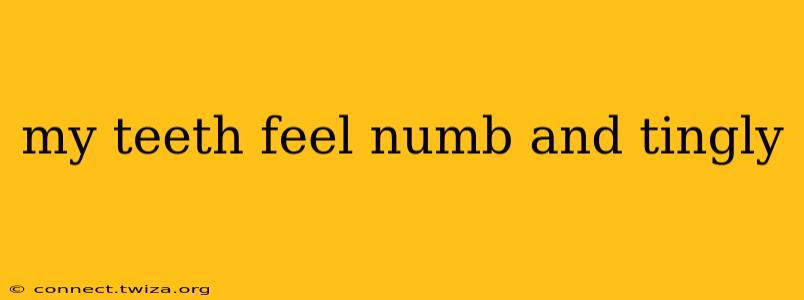Experiencing numbness and tingling in your teeth can be unsettling. This sensation, often described as pins and needles, can stem from various causes, ranging from minor temporary issues to more serious underlying conditions. Understanding the potential reasons behind this discomfort is crucial for seeking appropriate treatment.
What Causes Numbness and Tingling in Teeth?
Several factors can contribute to the unsettling feeling of numb and tingly teeth. Let's explore some common culprits:
1. Nerve Irritation:
This is frequently the underlying cause. Minor irritation of the nerves supplying your teeth can lead to temporary numbness and tingling. This irritation can arise from:
- Dental Procedures: Recent dental work, such as fillings, extractions, or root canal treatment, can temporarily affect nearby nerves.
- Trauma: A blow to the jaw or a significant impact to a tooth can also irritate the nerves.
- Grinding or Clenching: Bruxism (teeth grinding or clenching) puts significant pressure on the jaw and teeth, potentially causing nerve irritation and discomfort.
- Temporomandibular Joint (TMJ) Disorders: Problems with the TMJ, the joint connecting your jaw to your skull, can radiate pain and tingling to the teeth.
2. Oral Health Issues:
Poor oral hygiene can indirectly contribute to nerve irritation. Conditions such as:
- Gum Disease (Gingivitis or Periodontitis): Inflammation and infection of the gums can affect the nerves surrounding the teeth.
- Dental Abscess: An infection at the root of a tooth can put pressure on the nerve, leading to numbness or tingling.
- Cavities: Extensive decay can reach the nerve, causing inflammation and pain that might manifest as numbness.
3. Neurological Conditions:
In rarer cases, numbness and tingling in the teeth can be a symptom of a neurological condition affecting the trigeminal nerve, which supplies sensation to the face, including the teeth. These conditions could include:
- Multiple Sclerosis (MS): This autoimmune disease can damage the myelin sheath protecting nerve fibers.
- Bell's Palsy: This condition causes temporary facial paralysis that may include numbness in the teeth.
- Trigeminal Neuralgia: This nerve disorder causes severe facial pain, sometimes accompanied by tingling or numbness.
4. Medications:
Certain medications can have numbness or tingling as a side effect. Always review the potential side effects of any prescription or over-the-counter medication you are taking.
5. Other Potential Causes:
While less common, other possibilities include:
- Diabetes: Nerve damage (neuropathy) associated with poorly managed diabetes can cause numbness and tingling in various parts of the body, including the teeth.
- Vitamin Deficiencies: Deficiencies in certain vitamins, such as vitamin B12, can affect nerve function.
How Long Does Numbness and Tingling in Teeth Last?
The duration of numbness and tingling varies considerably depending on the cause. Temporary irritation from minor trauma or dental work may resolve within days or weeks. However, persistent or worsening numbness and tingling warrants a visit to a dentist or doctor.
When Should I See a Doctor or Dentist?
If the numbness and tingling:
- Persists for more than a few days: Don't ignore prolonged symptoms.
- Is accompanied by pain, swelling, or fever: These could indicate an infection.
- Is severe or accompanied by other neurological symptoms: This necessitates a medical evaluation.
- Is accompanied by changes in your sense of taste or touch: These could point to a serious neurological issue.
It's crucial to consult a healthcare professional for accurate diagnosis and treatment. They can perform a thorough examination, order necessary tests, and determine the appropriate course of action. Self-treating can be risky and delay proper care.
Can Numbness and Tingling in Teeth Be Prevented?
While you can't prevent all causes, maintaining good oral hygiene, regular dental checkups, managing stress (to reduce bruxism), and addressing underlying medical conditions can significantly reduce your risk.
This information is for general knowledge and informational purposes only, and does not constitute medical advice. It is essential to seek professional medical advice for any health concerns or before making any decisions related to your health or treatment.
